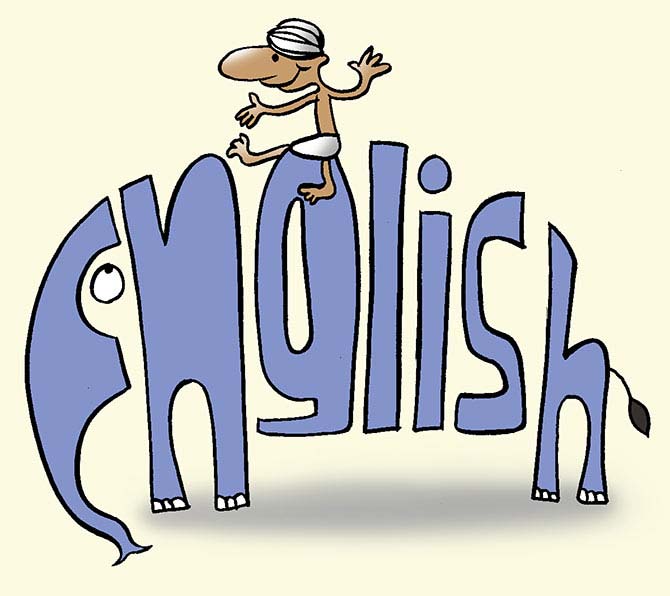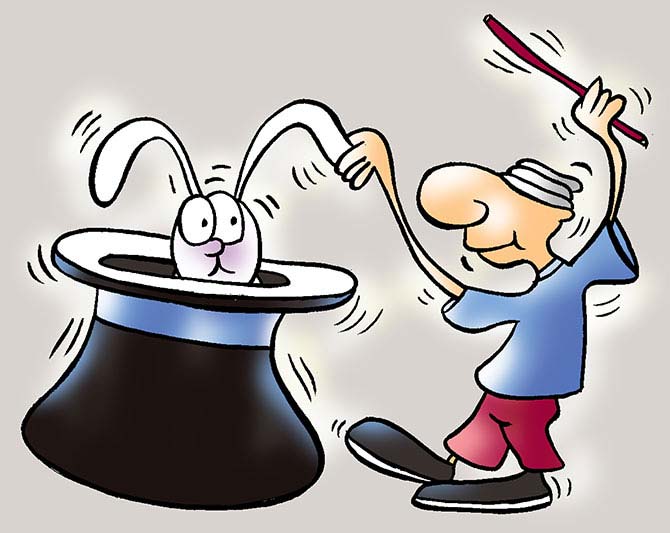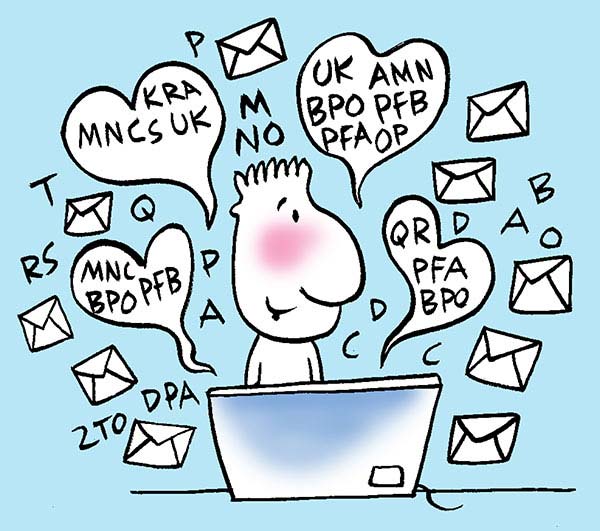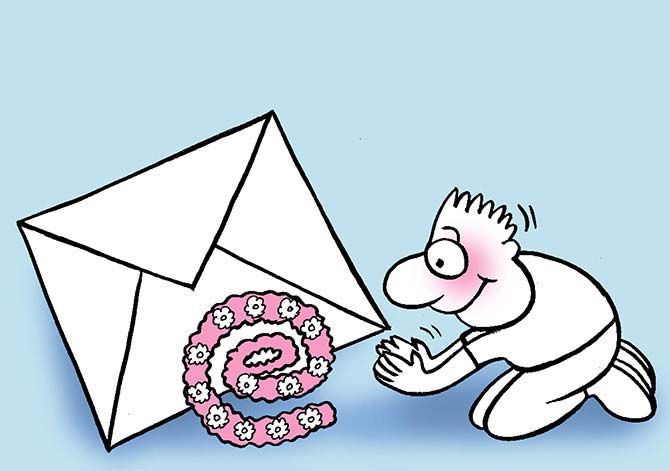 | « Back to article | Print this article |
Top 10 e-mail blunders Indians make
Do you start an e-mail with 'Dear Sir' or you just say 'Hi'?
Find out why what you write in your e-mail matters so much! (Illustrations by Uttam Ghosh/Rediff.com)
Indian languages and English have worked together for centuries.
Indeed, there are many Indian words which are now so embedded in English, that non-Indians might not even realise that they started life in the sub-continent -- words like 'bungalow', 'cot', 'cushy' and 'loot' are just some of the many.
However, just as the United States and the UK were once described as two countries divided by a common language, the Indian use of English can lead to misunderstandings outside India, more so in e-mail communication.
E-mails can carry messages of greater significance -- whether in monetary or contractual terms or in terms of future career potential.
The potential for misunderstandings is huge, and the potential for negative repercussions is even greater!
Here are some of the common e-mail mistakes we make and how we can correct them:
1. Not stating the purpose of an e-mail
It is perhaps worth starting with being clear about the purpose of an e-mail.
I am talking about e-mails in an international setting.
Between friends and colleagues, Indian to Indian, different rules might apply.
But if we are communicating between India and everywhere else (and perhaps between Indian states, and some might argue even within Indian states), we need to know what to look out for, if we want to be sure we are communicating clearly and effectively.
Always be careful not to offend your correspondent!
At the same time, e-mails have to be brief and to the point.
They are often read on very small screens, and therefore long, elaborate descriptions might simply become a reason to delete and move to the next message.
It's a difficult balance, and one which we could spend a lot of time getting right (remember the Blaise Pascal quotation: "I would have written a shorter letter, but I did not have the time"!).
The author is programme director, Kings Learning, a Bangalore-based spoken English training institute.
Please click NEXT to continue...
2. Incorrect salutation
The simplest thing to be able to get correct is how you should address the person you are writing to.
E-mails are not very formal, so starting off (as you might in a business letter) with Dear Sir is probably not appropriate.
If it is someone you know, then using their first name should be OK (unless you have a very formal relationship with them).
'Dear Andrew', or even 'Hi Andrew' is a good start.
The first time you write to someone, or if you feel that your relationship is not familiar enough to move to first name terms, then 'Dear Mr Brown' is fine (but never 'Hi Mr Brown' -- unless you want to sound like a second hand car salesman!).
One classic Indian mistake is to want to be friendly, so using first name terms, but also wanting to be respectful, so using 'Mr' or 'Mrs'.
This is a lovely idea, but it just isn't used in the English speaking world, and means we end up with 'Dear Mr Andrew'.
If you are going to use 'Mr' or 'Mrs' (or 'Miss' or 'Ms' for that matter), then you need to use the family name.
Please click NEXT to continue reading...
3. Incorrect question structure
Indian English is full of grammatical oddities and anomalies.
For example, many questions are formulated by intonation alone, such as 'What he wants?' or 'Where he is going?'.
While these will rarely affect understanding in spoken communication, these can be more problematic in written language.
Be careful, and use correct question formulation.
Here are some more examples:
Incorrect: When they are coming?
Correct: When are they coming?
Incorrect: Who you have come for?
Correct: Who have you come to see?
Incorrect: What you would like to eat?
Correct: What would you like to eat?
Please click NEXT to continue...
4. Incorrect English
English words are often used in India to express a different meaning than the one which native speakers are familiar with. This can be pretty confusing all round.
For example, in South India, a hotel is actually a restaurant.
Or in marriage advertisements, asking for a potential bride to be 'homely' and 'fair' doesn't mean that the would be bridegroom wants to marry someone who is plain and impartial, but rather to meet someone who has 'home-making skills' and who is 'light skinned.'
In India, they have a definite reference, and are correctly used between speakers who understand the reference.
However, if you are communicating with an international correspondent, you need to be careful that you are using the right terminology, and using it in a way which s/he will understand.
Perhaps the archetype of using existing English words in a new way is 'revert back'.
In fact, even as I type it, I notice that my spell checker doesn't like it! It is incorrect.
Indian speakers of English use it to mean reply or respond, as in 'I will get back to you on that.'
Although it is commonly used in India, elsewhere, the word 'revert' is most commonly used in expressions such as 'revert to type', particularly in the concept of a superficially well behaved person showing through their true, more basic, crude and brutish colours.
You wouldn't want to imply that about yourself!
Please click NEXT to continue...
5. Inventing and using new English words
Indian English has also managed to invent new versions of English words.
In the UK or US we might decide to change the scheduled time of a meeting to later on, or the next day.
We would describe the meeting as 'postponed'.
However, if we decide to bring the meeting forward, we don't have a word for it.
That oversight on the part of native speakers has proved to be no obstacle to Indian English speakers, some of whom will quite happily say: 'Please prepone the meeting..', rather than 'Please bring the (time of the) meeting forward.'
That being said, the word is recognised in the Oxford English Dictionary.
Please click NEXT to continue...
6. Using old fashioned words
Indian speakers of English have often learned from a teacher who also learned it in school, rather than acquired through interaction with native speakers.
This leads to some expressions surviving in India which are regarded as old fashioned elsewhere in the English speaking world.
An Indian speaker of English might use 'sad demise' rather than 'death', 'fair sex' rather than 'women'.
In fact, s/he might 'felicitate' you on your promotion, rather than 'congratulate' you.
These expressions are not wrong, but they will cause your correspondent to double take, and at least to smile at what might be perceived as a quaint use of English.
Please click NEXT to continue...
7. Using uncommon abbreviations
Indian English is full of abbreviations which are not common to the rest of the world.
Whilst someone from the UK will understand the idea of outsourcing a business process, the term BPO might take more than a moment to be understood.
And the whole world talks about multinationals, or multinational companies, or even multinational corporations (though we rarely talk about 'corporates' as a noun).
People from outside India might not understand MNCs.
Again, be careful not to lose your correspondent in a hail of unfamiliar acronyms.
Be careful about using terms like PFA (please find attached) and PFB (please find below); these terms are NOT used universally!
It's okay to love your abbreviations, but if you want to be understood, be very careful about using, or over using, them!
Please click NEXT to continue reading...
8. Incorrect terminology and numbers
Even English-speaking Indians use the system of calculating large numbers in 'lakhs' or 'crores'.
A lakh is a hundred thousand, and a crore is ten million.
Newspapers, TV, radio, advertising all use these numbers rather than the English ones, particularly when referring to money.
It is completely natural for an Indian to think this way because within India it isn't a problem at all.
But these terms just aren't used outside India.
We must remember that everyone else in the world deals in hundreds, thousands, millions and then billions -- and on the latter, there is pretty much a consensus that everyone uses the US definition of billion (a thousand million), and not the older UK definition.
Of course, I wouldn't be so crass as to say that lakhs or crores are wrong.
In India, between Indians, they are fine. But be careful not to alienate your international audience by throwing terminology at them which they simply don't know.
Please click NEXT to continue reading...
9. Courtesy and perceived courtesy
Courtesy is a funny thing. It is very culture specific, and something to be very careful about.
The English probably say 'Sorry' too much.
If someone bumps into a polite English gentleman who was standing still, his reaction will be to turn round and apologise for having been in the way, even though it was not his fault at all.
Most Indian languages don't usually use the word 'Please' as freely as in English.
Instead, politeness is expressed differently, by using the respectful form of 'you', or in the verb itself when using the polite form of address.
This politeness can often get lost in the translation to English.
As a result, Indian requests can sometimes appear as demands.
For example, whilst it would be completely natural for an Indian to say 'Just wait' (rather than 'Please wait'), or to say 'Regarding?' (rather than 'Can I ask what it is about?'), this could come across as too direct in many other countries.
In day to day Indian speech, 'Thank you' isn't used as much as in English.
This is partly because Indian culture does not instill the need to say 'Thank you' for every transaction.
If someone is only doing their job, or fulfilling their duties, then a special mention is not required. But be aware that it is used more freely elsewhere.
Even if someone is only doing the job which you paid them for, saying 'Thank you' isn't going to hurt you, and it might make them feel more positive about working with you next time.
So do not hesitate in using these words in your e-mail.
10. Signing off
Indian languages have elaborate systems of honorifics and terms of respectful address.
In speeches or letters, Indian speakers of English might appear ornate or flowery.
Indian business letters and e-mails can often end with the meaningless formula Thanking You, or have even more ornate salutations, such as:
- Kindly to do the needful...
- Salutations and prostrations... or
- Your obedient servant...
Going back to the main purpose of an e-mail -- brief, succinct communication -- we just need a quick, polite indication of respect.
We might offer 'Best wishes' or even 'Love' to our close friends and family, but to our business contacts we need to offer 'Regards', 'Kind regards', or perhaps 'Best regards'.
So, I hope that this quick jog through language and electronic business communication has been useful, and that it gives you some ideas to bear in mind when you are next writing an e-mail for work.









